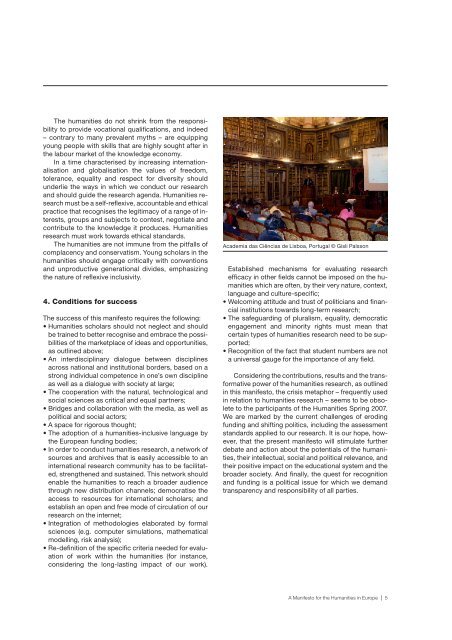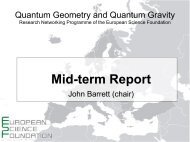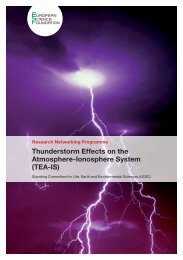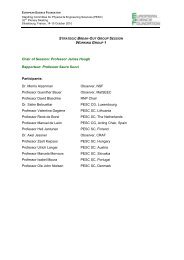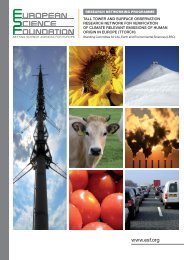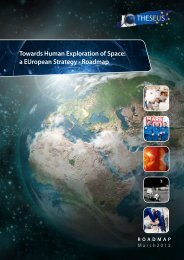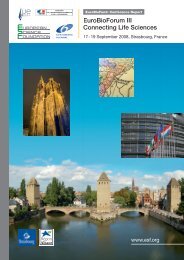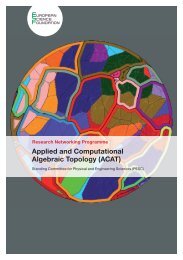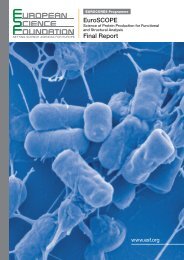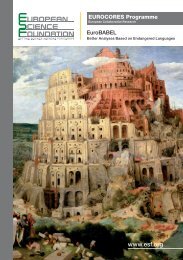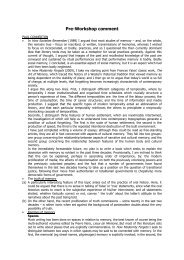SCH Manifesto.pdf - European Science Foundation
SCH Manifesto.pdf - European Science Foundation
SCH Manifesto.pdf - European Science Foundation
- No tags were found...
You also want an ePaper? Increase the reach of your titles
YUMPU automatically turns print PDFs into web optimized ePapers that Google loves.
The humanities do not shrink from the responsibilityto provide vocational qualifications, and indeed– contrary to many prevalent myths – are equippingyoung people with skills that are highly sought after inthe labour market of the knowledge economy.In a time characterised by increasing internationalisationand globalisation the values of freedom,tolerance, equality and respect for diversity shouldunderlie the ways in which we conduct our researchand should guide the research agenda. Humanities researchmust be a self-reflexive, accountable and ethicalpractice that recognises the legitimacy of a range of interests,groups and subjects to contest, negotiate andcontribute to the knowledge it produces. Humanitiesresearch must work towards ethical standards.The humanities are not immune from the pitfalls ofcomplacency and conservatism. Young scholars in thehumanities should engage critically with conventionsand unproductive generational divides, emphasizingthe nature of reflexive inclusivity.4. Conditions for successThe success of this manifesto requires the following:• Humanities scholars should not neglect and shouldbe trained to better recognise and embrace the possibilitiesof the marketplace of ideas and opportunities,as outlined above;• An interdisciplinary dialogue between disciplinesacross national and institutional borders, based on astrong individual competence in one’s own disciplineas well as a dialogue with society at large;• The cooperation with the natural, technological andsocial sciences as critical and equal partners;• Bridges and collaboration with the media, as well aspolitical and social actors;• A space for rigorous thought;• The adoption of a humanities-inclusive language bythe <strong>European</strong> funding bodies;• In order to conduct humanities research, a network ofsources and archives that is easily accessible to aninternational research community has to be facilitated,strengthened and sustained. This network shouldenable the humanities to reach a broader audiencethrough new distribution channels; democratise theaccess to resources for international scholars; andestablish an open and free mode of circulation of ourresearch on the internet;• Integration of methodologies elaborated by formalsciences (e.g. computer simulations, mathematicalmodelling, risk analysis);• Re-definition of the specific criteria needed for evaluationof work within the humanities (for instance,considering the long-lasting impact of our work).Academia das Ciências de Lisboa, Portugal © Gisli PalssonEstablished mechanisms for evaluating researchefficacy in other fields cannot be imposed on the humanitieswhich are often, by their very nature, context,language and culture-specific;• Welcoming attitude and trust of politicians and financialinstitutions towards long-term research;• The safeguarding of pluralism, equality, democraticengagement and minority rights must mean thatcertain types of humanities research need to be supported;• Recognition of the fact that student numbers are nota universal gauge for the importance of any field.Considering the contributions, results and the transformativepower of the humanities research, as outlinedin this manifesto, the crisis metaphor – frequently usedin relation to humanities research – seems to be obsoleteto the participants of the Humanities Spring 2007.We are marked by the current challenges of erodingfunding and shifting politics, including the assessmentstandards applied to our research. It is our hope, however,that the present manifesto will stimulate furtherdebate and action about the potentials of the humanities,their intellectual, social and political relevance, andtheir positive impact on the educational system and thebroader society. And finally, the quest for recognitionand funding is a political issue for which we demandtransparency and responsibility of all parties.A <strong>Manifesto</strong> for the Humanities in Europe | 5


